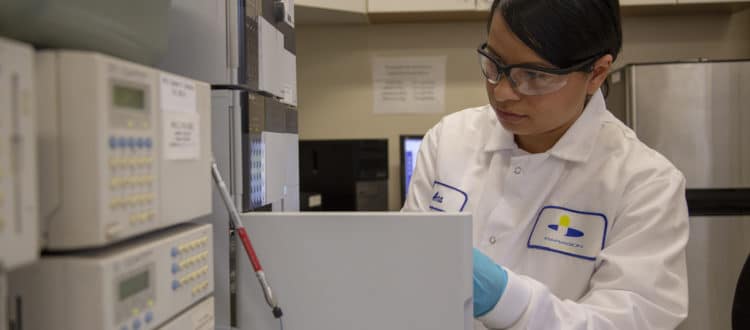Under the Hood in Paragon’s In-house Laboratory
Paragon Laboratories takes pride in having in-house laboratories for both chemistry and microbiology. With fully trained and certified chemists and biochemists, we are able to provide an unmatched level of analysis and quality for all raw materials and finished products.
Thanks to our state-of-the-art equipment, we are fully capable of producing complex formulations. Our lab allows us to provide quicker lead times and a finished product that is of the highest quality and standards, without compromise. Additionally, we are able to perform 95% of all required testing in our facilities, leaving only 5% to be sent out to certified independent laboratories.
Paragon’s scientists are able to produce these results thanks in part to our top-of-the-line equipment and instrumentation. Below are just some of the tools that help us provide the highest quality for our customers.
High Performance Liquid Chromatography System
The workhouse of the laboratory, the HPLC is used for quantitative and qualitative analysis of vitamins, market herbal compounds, and many of the molecules that can be solubilized in liquid. You can learn more about how this system works here.
FTIR Spectrometer
FTIR, which stands for Fourier Transform Infrared, is the preferred method of infrared spectroscopy. The spectrometer works by passing IR radiation through a sample. The sample typically absorbs some of the radiation, while allowing some of it to pass through. The resulting signal represents the molecular ‘fingerprint’ of the molecule. In Paragon’s laboratory, the FTIR Spectrometer allows us to properly identify molecular samples and ensure your product contains the highest quality materials.
Inductively coupled plasma mass spectrometer (ICP)
The ICP Mass Spectrometer is used for heavy metal and mineral analysis. It can quantify minerals down to parts per billion. Sample elements are introduced into the spectrometer, where it is then combined with Argon gas and a heat source causing the molecules break apart, allowing the constituent atoms to ionize. The ions are then separated and detected by the mass spectrometer.
Thin-layer chromatography (TLC)
Thin-layer chromatography, also referred to as TLC, is a state-of-the-art technique used to assess and identify the quality of botanical ingredients and products. Used properly, it is often able to detect any adulterants or contamination of botanical materials. The technique applies to a variety of botanical materials including raw, powdered, or whole form ingredients.
UV-Vis Spectroscopy
Ultraviolet-visible (UV/Vis) spectrophotometers are used to quickly determine the concentration of an analyte in solution. The spectrophotometer beams a wavelength between 180 and 1100nm through a solution in a cuvette. The sample absorbs the UV light and the results can be used to determine the concentration of an absorber in a solution.
These pieces of equipment are just a few of the instruments we utilize to test and measure our products at every step of the production cycle. To understand more about our lab’s capabilities and how we can customize the right formulation for you, contact us or email sales@paragonlabsusa.com.

